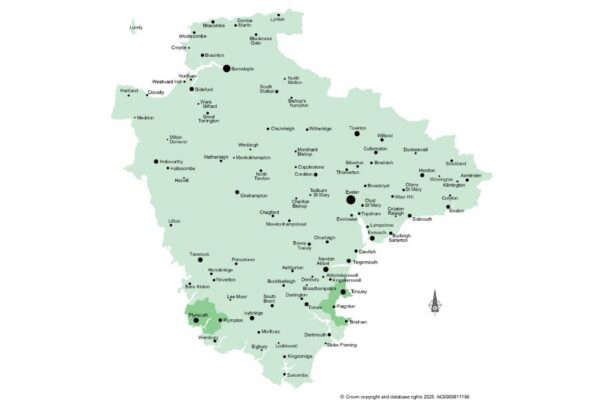
As part of the ongoing upgrade of Devon’s fleet of 37 frontline gritters, another six gritters have been replaced with newer models ahead of this winter.
Last winter’s biggest issue was the prolonged wet spell which caused extensive damage to Devon’s highway network. This led to a 31% increase in pothole repairs between January and April, compared to 2023, and 94% more than the same period in 2022.
However, in terms of dealing with icy conditions, last winter was relatively quiet, with Devon County Council’s gritting teams only using around 6,200 tonnes of salt – which was less than half the amount used the previous winter. But more time was spent cleaning gullies and clearing debris from roads due to torrential rain and several named storms.
Councillor Stuart Hughes, Devon County Council Cabinet Member for Highway Management, says it highlights that Devon’s highway teams have to be prepared for all eventualities over the next few months.
Councillor Stuart Hughes said:
“From one winter to the next you never know how bad conditions will be, so our teams have to be ready for whatever they may have to face. We’ve ensured that our depots are fully stocked with salt at the start of the season and our frontline gritters are on standby to treat our precautionary salting routes as and when needed.
“As always, we also enable communities to support themselves on routes that aren’t on our gritting network, with volunteer snow wardens across the county looking after their priority roads. There are also grit bins available in strategic locations to be used on the public highway and we’d urge communities to check if theirs need re-filling ahead of cold weather.
“Even if it ends up being relatively mild, our highways staff will undoubtedly be kept busy, particularly if we experience more intense downpours of rain which are becoming far more frequent all year round. No matter what, our teams will be doing everything they can to keep Devon moving.”

Simon Kane, Contract Manager for Milestone Infrastructure, said: “We’ve got the largest road network in the country and as a result our teams are busy all year round, whether it’s gritting, emergency service, drain cleaning or maintaining the roads. It’s worth remembering that our gritter drivers are also the same people that during the day fix the roads, empty gullies and deal with emergency issues. In the depths of winter, the drivers take on the responsibility and risk driving large gritting vehicles, sometimes in very difficult conditions, so that’s where the credit belongs.”
Devon’s Network Operations Control Centre in Exeter uses CCTV, weather information, traffic and congestion data to monitor Devon’s road network 24 hours a day, every day of the year.
As part of the ongoing upgrade of Devon’s fleet of 37 frontline gritters, another six gritters have been replaced with newer models ahead of this winter. These replacement vehicles include touchscreen controls to enable drivers to adjust their plough attachments without leaving their cab.
To support active travel, around 14 miles of Exeter’s busiest cycle routes will continue to be treated this winter. It follows a successful trial over the last two years of the “Powerflex” vehicle which is small enough to travel on shared use paths in the city.
Around 24,000 tonnes of salt are stored in gritting depots across the county at the start of the season.
There are also more than 3,500 grit bins located across Devon to support community self-help on roads which are not on the gritting network. These supplies must only be used on the public highway. At this time of year, local communities are encouraged to check grit bins in their area. Empty grit bins can be reported via our “Report It” webpages.
If you would like to find out about Devon’s snow warden scheme visit our communities webpages or contact Parish Council representatives who can liaise with their local Neighbourhood Highway Officer.

 Vulnerable could be key battleground in council tussle
Vulnerable could be key battleground in council tussle
 Devon County Council welcomes national report supporting protection of vital care services
Devon County Council welcomes national report supporting protection of vital care services
 Devon’s public health leaders have ‘significant concerns’ about extending licencing hours
Devon’s public health leaders have ‘significant concerns’ about extending licencing hours
 Towns and parishes urged to act now to regain control of community facilities
Towns and parishes urged to act now to regain control of community facilities










